Turkey’s Attacks on Rojava
Journalist and photojournalist Giacomo Sini reports for Bella with testimonies from the YPG International and the Military Council of Tell Tamr about the increasing tense situation in the area.
The roar of heavy weapon and artillery fire break the silence of the night in Heseke Canton. These are shots fired by Turkey-backs militias and Ankara’s army from Erdoğan-occupied territories inside Syrian soil. Turkey has launched five offensives in northern Syria since 2016 until today. One of the latest, named “Operation Peace Spring” was conducted, with the support of armed groups belonging to the Syrian National Opposition (SNA), throughout the whole territory administered by the Autonomous Administration of North and East Syria (AANES).
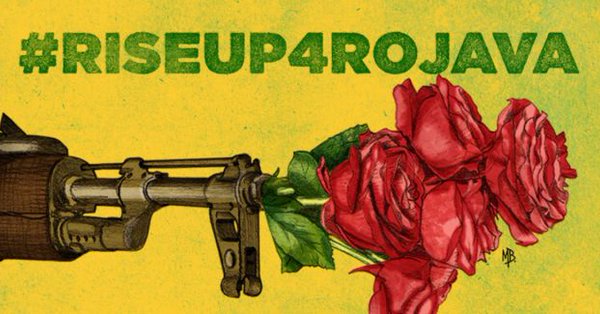
In the early hours of the morning, the M4 international highway appears quiet. Along this strategic axis, bordering the occupied areas, lies the town of Tell Tamr. Following the latest Turkish invasion in 2019, the area is under attack on a daily basis, mainly targeting villages close to the Khabour River in an attempt to reach the motorway. “When Islamic State militias attempted an assault on al-Sina’a prison in Heseke at the beginning of the year, we tried to reach our comrades in distress with a caravan of vehicles,” says Demhat Brusk, co-commander of the Tell Tamr Military Council, affiliated with the Syrian Democratic Forces (SDF). “As the attack became more violent, Turkey and its allies hit our forces, attempting to prevent us from reaching the city”, Brusk continues. “The raids came right from the occupied territories, making it clear that the Islamic State’s offensive was well known and covered up by the Turkish authorities, in an attempt to destabilise the area”. Sitting by his side, Zilan Tal Tamr, YPJ (Women’s Protection Unit) commander of the Military Council emphasises how “Especially after the Turkish invasion, the whole population is resisting and supporting the council, given such a delicate moment”. Then she adds, “The patriarchal context initially made it difficult for women to be present alongside the male fighters in northern Syria. Society quickly accepted this process and today “women are one of the most prominent components in the battle against the occupation. In North-East Syria, we are active in every social sphere, not only in the military, and we fight for gender equality that favours the whole revolutionary process”, concludes the commander.
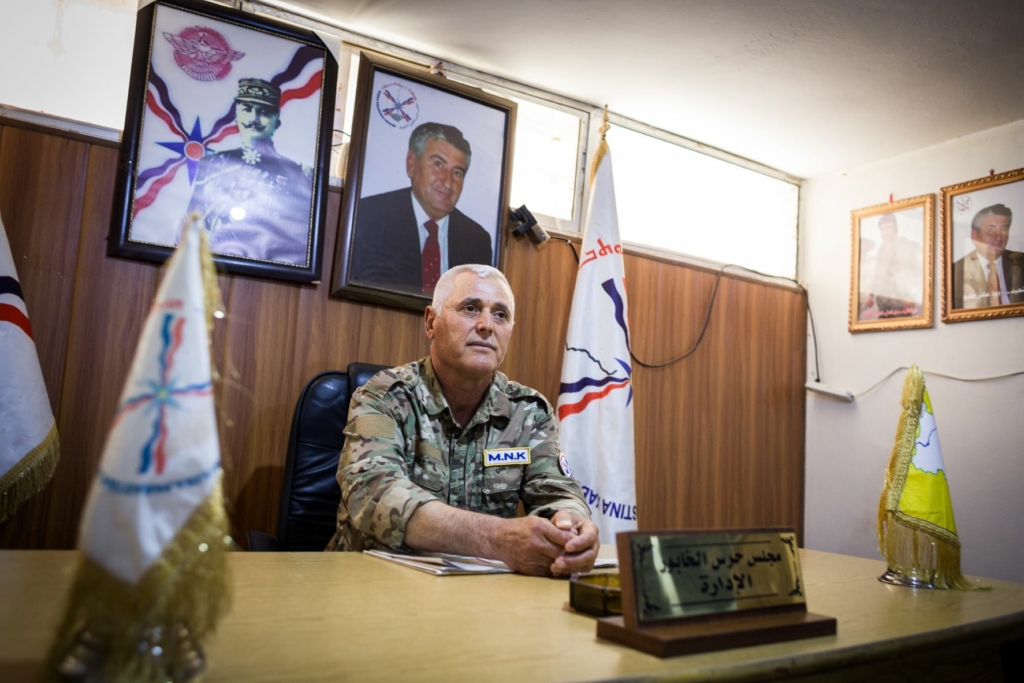
Nabil Warda, spokesman for the Assyrians Khabour Guards, a militia gathering Assyrians from the area of Tell Tamr, a town crossed by the river Kabhour, in the frontline against the Turkish army and Ankara’s allied militias in North East Syria
The area of Tell Tamer is predominantly inhabited by Syriac and Assyrian Christians, Kurds and Arabs who suffered massive massacres during the advance of ISIS in 2015. A few metres from the headquarters of the Military Council of Tell Tameir, Xabûr Ekad, sits with some militiamen in front of the building where the Syrian/Assyrian Military Council of the Khabour region is based. He is among the organisation’s spokesmen and tells how the town of Tell Tamr underwent “a huge exodus of people abroad between 2012 and 2015, during the war against various Jihadist groups and later against the Islamic State”. Thanks also to the progress made by the Military Council, many expatriates returned to contribute to the social development of the area. “These people come back to help the regrowth of the community and many of them have fallen in the fighting against the Turkish occupation forces and their allies, we must not forget that”, Ekad points out.
From the hill overlooking the town, the front line is only a few kilometres away. A church stands among the houses below, “There used to be more than 30 in this area, scattered among various settlements, they have all been damaged, destroyed or are inaccessible due to the attacks. Only that one, the oldest, remains. Who remained in the Tell Tamr area gather there for celebrations”,says Nabil Warda, spokesman for the Assyrians Khabour Guards, a militia that gathers Assyrians in the area.
“We gave shelter to fifty families fleeing from villages attacked by the Turks. They want to wipe out the Syriac/Assyrian presence from the area, we are ready to protect the whole community to the last drop of blood,” remarks Warda, “we are not only defending Christians, we are defending a project of coexistence and tolerance that is constantly threatened”.
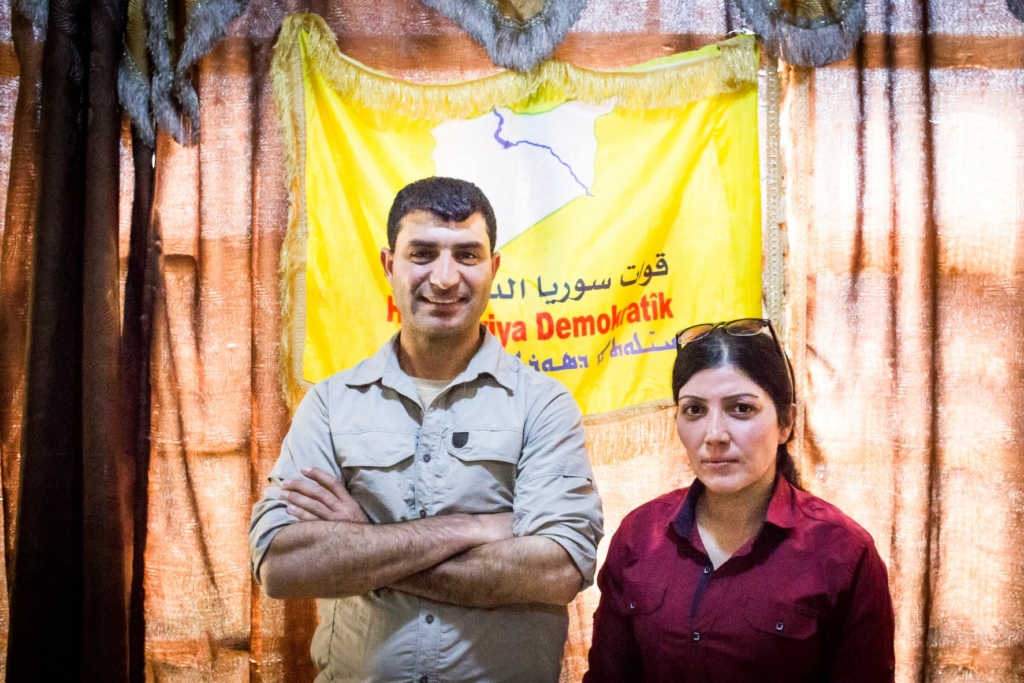
Demhat Brusk and Zilan Tell Tamr, co-commanders of the Military Council of Tell Tamr, a town located on the Khabour River in North East Syria, on the frontline against the Turkish army and Ankara’s allied militias in the area
On 1 June, Turkish President Recep Tayyip Erdoğan, during his speech at the meeting of the parliamentary group to which the Justice and Development Party (AKP) belongs, stated, “We are entering a new phase in our decision to create a 30-kilometre corridor in northern Syria to protect our borders: we will free the area from terrorist occupation”.
In Heseke, not far from the town of Tell Tamr, Kendal Rojava, a young member of the YPG International, responds to the Turkish president’s statements by saying that “under the pretext of a battle against what Ankara calls “terrorism”, Erdoğan is trying to expand his borders”, then adds, “Turkey’s intention is to extinguish the Kurdish presence in the area and cancel the democratic and inclusive project carried out together with the various populations in the area”.
Since the occupation by the Turkish army in 2019, there has been “a gradual increase in attacks from the occupied areas, such as Serekaniye”, reports Rojava. “From these areas Turkey systematically attacks important civilian infrastructure, mainly using Islamist and Jihadist allies”, adds Disloz Ciwan, a young volunteer.
According to Erdoğan’s statements, the new “military operation” will initially focus on the areas of Manbij and Tal Rifat, but Ankara does not exclude that “the action will later expand to other areas”. The Turkish objective is clear: disrupt the geographical continuity of the AANES by occupying the entire border strip. “Turks are gathering many troops in the areas in the vicinity of Manbij and Tell Rifat, surrounding areas where people who fled the occupation of Afrin live”, Ciwan explains.
“In Afrin, the population is forced to learn Turkish, they use Turkey’s currency and the energy system is connected to that of Ankara,” the fighter says. “Turkey, as it did in Afrin, wants to carry out its own ethnic/political project in the whole area”, continues Zafer Zagros, a young YPG member. “We should not forget that it is the 100th anniversary of the Lausanne Agreement, which marked the consolidation of the Turkish Republic. Erdoğan, with his nationalist allies, is trying to impose a neo-Ottoman agenda in the Middle East”, stresses the militiaman. “In doing so, there has always been a Turkish support – including logistical – for the new ISIS activities, as explained by many of the ISIS militiamen SDF have captured lately”, Ciwan continues. ISIS has indeed resumed its operations in northern Syria in recent months, carrying out several deadly attacks. “It is no coincidence that, at the time of his killing, Al-Qurayshi, one of the leaders of the Islamic State, was near the Turkish border, not far from three important Ankara military bases in the area”.
In the areas threatened by a new invasion, as Rojava states, “people are used to intimidation by Turkey and its allies”.
So far there is no precise evaluation of how many people are fleeing for fear of a new Turkish invasion, but “what can be seen here is that there is a popular reaction to Erdoğan’s statements. There are daily demonstrations in support of the SDF and against the imminent attack,” says the fighter.
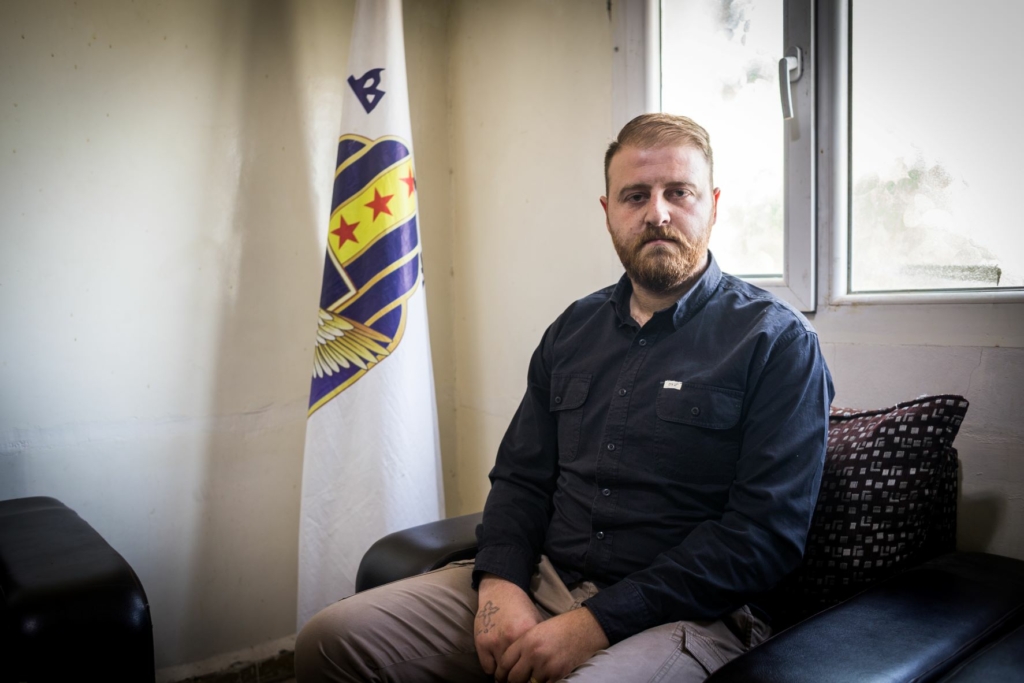
Xabûr Ekad, one of the spokesmen of the Syriac/Assyrian Military Council, an organisation that gathers Syriac-Assyrian militias in the Khabour region
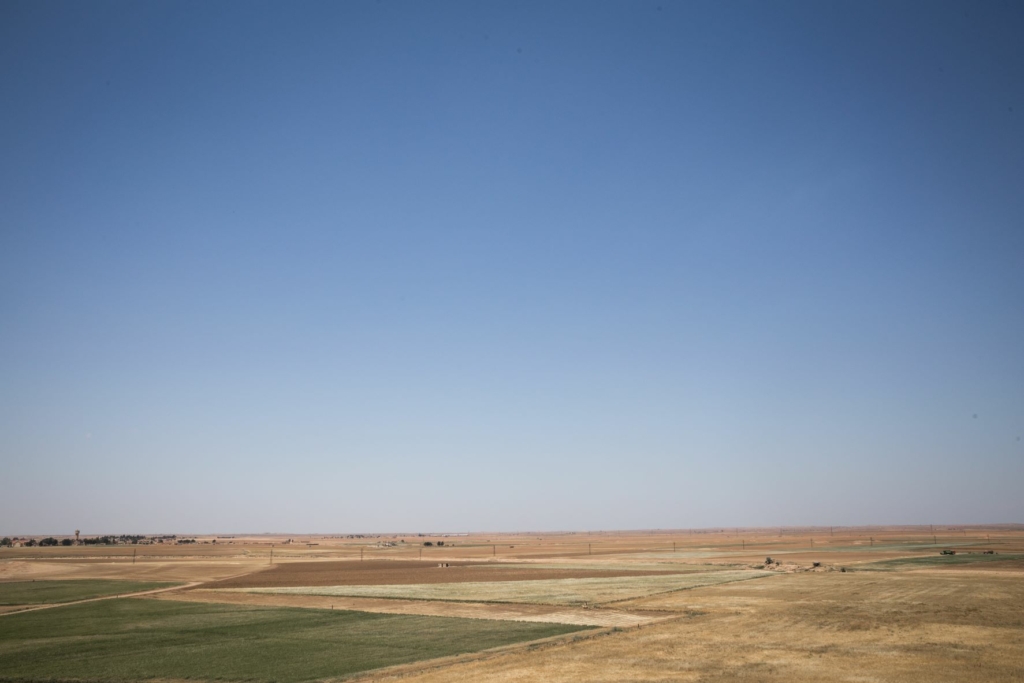
A view of the frontline against Turkish troops and Ankara’s allied militias in North East Syria, near Tell Tamr, on the Khabour river.
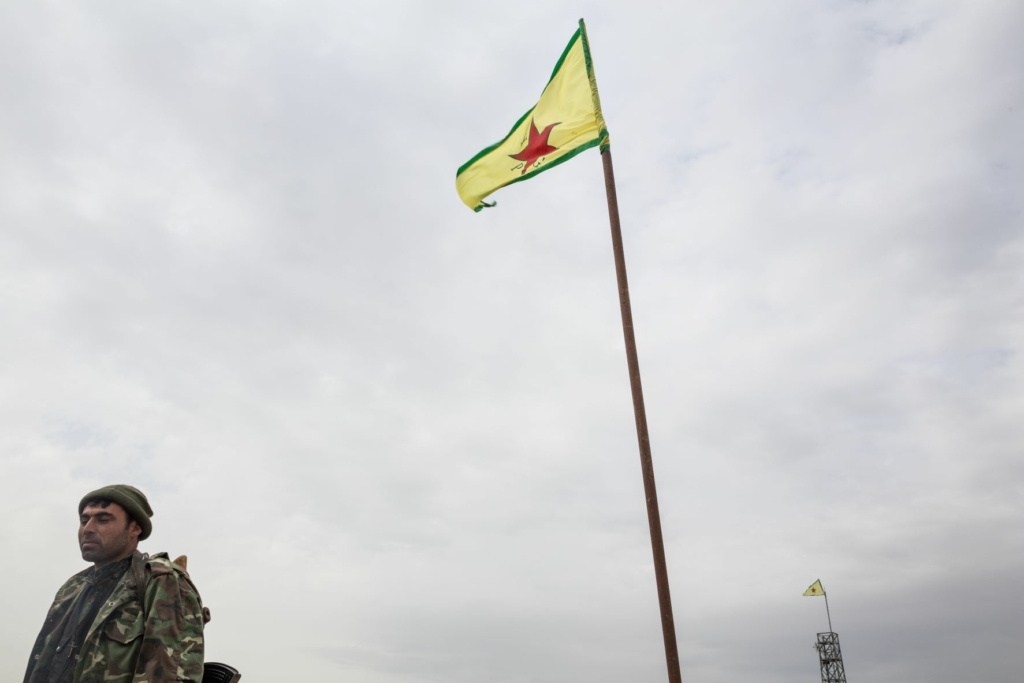
A Ypg position on the southern skirt of Kobane within the frontline against ISIS. 2015
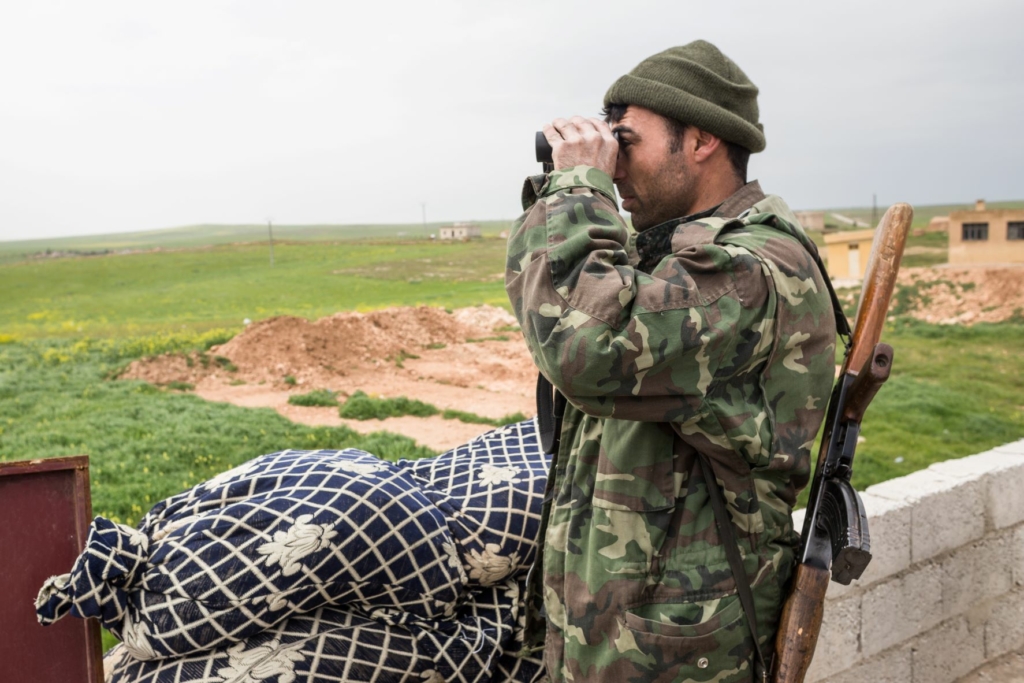
A Ypg militia-man watching ISIS’ position on the frontline against ISIS on southern area of Kobane. 2015
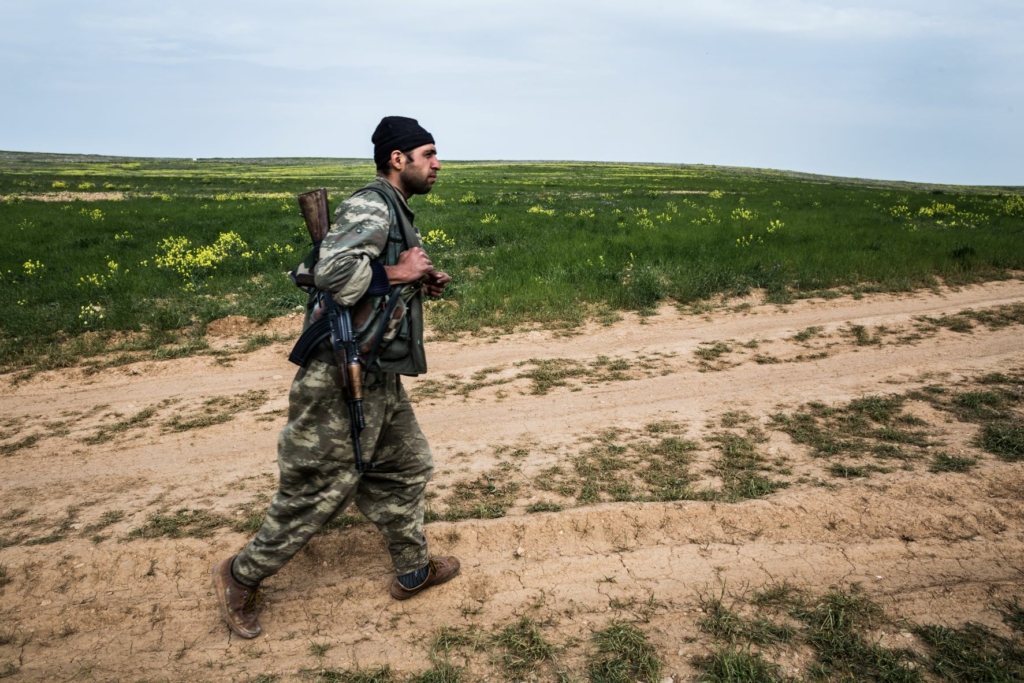
A YPG member walking down the frontline on Sarrin area, some km south of Kobane. 2015.
Morover the leaders of the Arab tribes in Manbij declared in a public statement their opposition to any Turkish intervention in the area, condemning the constant bombing by Ankara and the SNA, “which is taking place in the complete silence of the international community” .
The situation is very tense. Wthin the areas Erdoğan would like to occupy the economic situation is not any better, due also to the sanctions against Syria. “There is a lack of water, which makes the living conditions of the population even more precarious. Those are areas where first Assad imposed his repression, then ISIS arrived with its brutal violence”,says Zagros. “With the 2012’s revolution, many progresses were made, ensuring a better social model than in other parts of the Middle East.
In northern Syria, the Executive Councils of the administrations living under the threat of imminent war are clamouring for strong international condemnation of Turkey’s new projects. “A project that peacefully unites people of different religions and backgrounds is in danger”, Ciwan explains, “what exists in northern Syria is an example of how the world can live without discrimination, it is a symbol of progress and equality”, Rojava echoes him. “We have no option but to defend and not retreat, for us it is a question of existence or not”, Zagros reminds, “we are ready to protect all those achievements made with the people of these areas in recent years, at the cost of our lives”.
All photo credits: Giacomo Sini

Thanks for the update, Giacomo.
I wondered if NATO could expel a member nation, say Turkey. It is absurd for a nation to bind itself automatically to the defence of all other members even if those members routinely act in defiance of NATO’s own stated principles (and I don’t single out Turkey here). https://www.justsecurity.org/66574/can-turkey-be-expelled-from-nato/
Just suppose the USA elected a Christian fundamentalist armageddonist regime tomorrow on a programme of waging holy war on infidels. Isn’t NATO membership just a suicidal way of ceding foreign policy to insane partners? I distinguish the omnicidally belligerent NATO military alliance from the more peace-project European Union common foreign and security policy, which prefers economic to military force. But would we even hear about deliberations on the potential for Turkey’s material breach in the anti-democratic NATO?